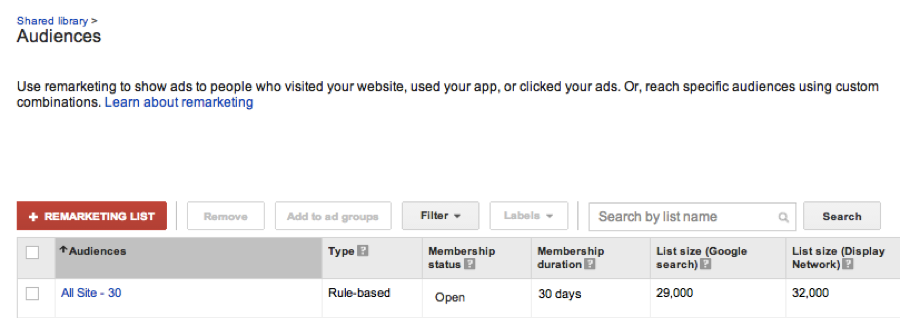
The data is so rich that it tells a story about your AdWords audience that is so useful that it can change your paid search strategies in just a short period of time. Only a few advertisers use this hidden, secret data…because only a few know how to tap into it or set up AdWords to give it to them.
RSLA and Remarketing
There is a wealth of hidden data inside your audience lists. Lets start with one of the most obvious sources, the time lag between engagement and conversions.
Most advertisers will have at least two audiences set up in AdWords: all visitors and conversions. The more ambitious might set up an audience for all visitors – last 7 days and maybe another for all visitors – last 30 days. Consider how much information you would have about your AdWords account if you took the time to break out your audiences just a little more.
Time lag audience examples:
- all visitors -1 day
- all visitors -3 days
- all visitors – 7 days
- all visitors -14 days
- all visitors – 30 days
- all visitors – 60 days
- all visitors – 365 days
By setting up a wider set of audiences, a travel company might learn that top funnel keywords like Hawaii vacations have the highest conversions for their 14-day audience while buying keywords like “book Oahu volcano tour” convert in one to three days.
Data is useless unless you know how to use it so here are a few examples for using time lag data:
- Take advantage of your new-found knowledge and begin increasing and decreasing your bids based on performance. It might be worth increasing the bid 10% for buying keywords for your one and three day audiences.
- Create new remarketing campaigns for display that aggressively target your one to three day audience on sites with content around the mindset of booking a tour in Hawaii.
- Break out high traffic and/or highly competitive keywords into an RSLA (Google’s search remarketing) campaign and then vary those keyword bids based on audience data from previous campaigns.
You can continue to micro-segment your audiences by categories. A retail store might segment audiences into men and women’s clothing and then discover that men’s clothing converts much faster than women’s across all keywords while certain types of keywords for women’s clothing have very specific time lags.
Micro segmenting your audiences could also be helpful when combined with specific types of products to plan for future AdWords promotions. A garden supply company that sells vegetable seeds in one season, might use a seed audience categorization strategy to promote juicers and canning supplies during the harvest season.
Breaking Down Location Data
Most geo targeting strategies are at a very high level such as targets towards Dallas or Texas. Breaking your geographic targeting into much smaller pieces such as counties, zip codes, airports, military bases, etc. can give you all kinds of data on reach, cost per click for that audience, cost per conversion.
The practical application for this additional data would be to use this data either for bid adjustments (up or down) or to break out your campaigns into a focus on geographic areas that perform well for you with specific ad copy and landing pages for those locations.
Adding Location Demographics to the Mix
Location demographics are another rich source of information on your audience. You may never use the bid adjustment options (unless you want to) but how useful is this information to have for planning out your display remarketing strategy (such as: choosing audiences, topics or specific sites)!
Topic Codes Show Ad Distribution For Your AdGroups
For Google display, regardless of the type of strategy you are using (placements, keywords, etc.) You can upload a list of targeting across ALL topics into your adgroups to get some rich data showing you the sweet spots for where that strategy is working for you. The easiest way to set this up is to copy all the topic codes from the AdWords help section and then do a bulk upload using AdWords editor for placements into your display network adgroups. Everything else about your strategy will be normal. After running your campaigns just a day or two, you’ll be amazed at how quickly this data accumulates.
How powerful is this data? Most AdWords advertisers think in big buckets. For example if a company sold basketball hoops, most advertisers would “safely” set up Google display campaigns that target keywords and placements focused on basketball. But Google’s inventory is so vast that often times conversions can come from sites, landing pages and sources that we don’t realize are available to us. Using the topic code strategy, an advertiser might discover that the topic for parenting (it looks like this: category::People & Society>Family & Relationships>Family>Parenting) is getting great view-through conversions or assisted conversions for basketball hoop ads. That information gives the advertiser the data needed to set up a display campaign aimed specifically towards parents and can justify giving additional budget to that targeting.
Interest Audiences Offer Different Data For Google Display and Mobile
Google’s interest audiences are another area rich in data. If you are doing mobile campaigns you will see that the audience options for mobile are very different from the options available for Google Display. By diving deep into mobile audiences you may find that your mobile ads towards parents are being shown on children’s games where there is no opportunity for conversions or you may find that your business travelers get bored and play certain types of games while they are traveling creating new opportunities for you to focus your mobile ad spend.
Avoiding AdWords Management and Information Overwhelm
Have you ever noticed that some people dive into deep end of the pool while others start at the shallow end and gradually ease themselves in while getting accustom to the cold water slowly? I realize that some of you will dive all into these strategies but for those of you who are a little more tentative, it’s okay to start slow. If you want to test some of these strategies before applying them across entire accounts or campaigns, take your highest traffic campaign(s) and start folding these data options in. You don’t have to set up any bid adjustments when you first get started…that’s partly why you set these up now…to learn and look for those opportunities for the future.
I would like to highly encourage you to set up a task and deadline to review the data in a few days or a week or a month and then set recurring tasks to review the data and expand on what you have learned. Otherwise, because the data is somewhat hidden, you may lose out on some great opportunities for optimizing your account.
You don’t have to remove the data options later. Some people are so “tidy” about their campaigns that they feel like they need to simplify them and clean all that “extra” stuff out of them. Let the data accumulate statistics and audience insight for you then do an all account review every month or every quarter. You will be surprised at how much you will learn about your paid search audience, your buyers and how effective certain areas of your AdWords strategy really are.
Feedback
What have you learned from your own experiences with these sources of data within Google? I would love to hear your success stories, your failures and your thoughts.
Latest posts by Shelley Ellis (see all)
- Increase Google AdSense Publisher Revenue By Utilizing Google Display Network Data - February 13, 2015
- Accomplishing a 45% Conversion Rate on a New AdWords Account - October 15, 2014
- How to Find Hidden Data in Your Google AdWords Account - August 29, 2014
- The Evolution of Google AdWords Agency Reps - August 1, 2014
